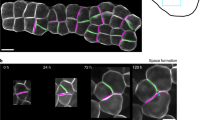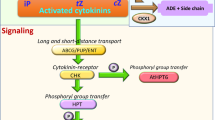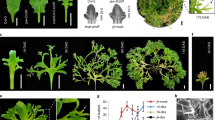Abstract
IN an earlier communication1 I described the “leaf vernalization” of leaf cuttings of Lunaria biennis. After cold treatment, such cuttings from leaves of adult plants regenerate and yield flowering plants, while without a cold treatment no flowering occurs. It was left undecided exactly where in the leaf cutting the vernalization takes place—in the leaf as a whole or in meristematic cells only. Evidence has been obtained now that the locus of vernalization consists of cells which are in the process of mitosis.
This is a preview of subscription content, access via your institution
Access options
Subscribe to this journal
Receive 51 print issues and online access
$199.00 per year
only $3.90 per issue
Buy this article
- Purchase on Springer Link
- Instant access to full article PDF
Prices may be subject to local taxes which are calculated during checkout
Similar content being viewed by others
References
Wellensiek, S. J., Nature, 192, 1097 (1961).
Hagemann, A., Gartenbauwissensch., 6, 120 (1932).
Author information
Authors and Affiliations
Rights and permissions
About this article
Cite this article
WELLENSIEK, S. Dividing Cells as the Locus for Vernalization. Nature 195, 307–308 (1962). https://doi.org/10.1038/195307a0
Issue Date:
DOI: https://doi.org/10.1038/195307a0
This article is cited by
-
Wheat genomic study for genetic improvement of traits in China
Science China Life Sciences (2022)
-
Remembering winter through vernalisation
Nature Plants (2018)
-
The Poetry of Reproduction
Plant Molecular Biology (2008)
-
Historical perspective on breakthroughs in flowering field
Journal of Plant Biology (2007)
-
Vernalization in Arabidopsis thaliana is mediated by the PHD finger protein VIN3
Nature (2004)
Comments
By submitting a comment you agree to abide by our Terms and Community Guidelines. If you find something abusive or that does not comply with our terms or guidelines please flag it as inappropriate.



